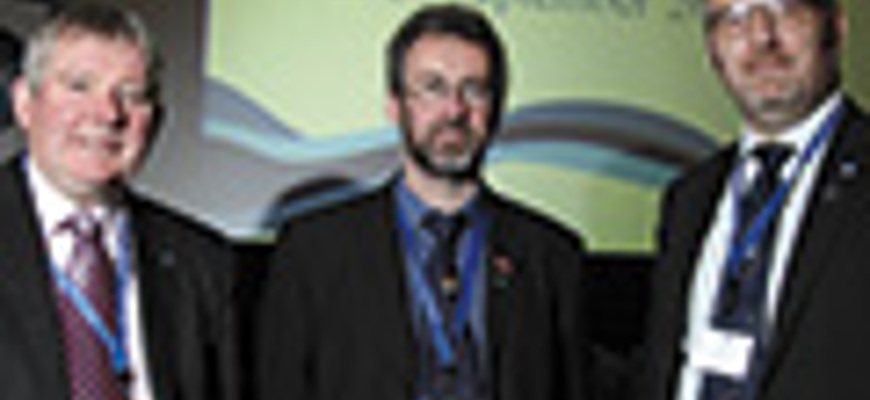Island futures

What are the current hot topics for your legal team, and what do you predict for 2014?
Independent economic forecasts warn of continued and potentially serious reductions in public sector funding from 2014 to 2018. Orkney Islands Council is tackling predictions of continuing economic austerity head on, through a special team to explore and drive forward new and more efficient ways of delivering services. Legal Services will play a key role by helping to ensure that the council continues to meet its statutory obligations, across all services, as efficiently as possible.
We will be working closely with our colleagues in Orkney Health & Care as we seek to maximise the benefit of new legislation requiring integration of health and social care services.
Another hot topic is records management. It is my job to ensure that the council meets the requirements of the Public Records (Scotland) Act 2011 by retaining the highest standards of management. Good information governance is critical to the success of an organisation.
What gets you up in the morning?
The variety of the work I do. In one week recently I attended meetings on freedom of information; records management; complaints against the council; the full council; recovery of care charges; child protection; health and social care integration; equality legislation; shipping operations within our harbour area; and the council’s constitution. In addition, I have a meeting of the general committee of the Society of Local Authority Lawyers & Administrators (SOLAR). This brings local government’s senior solicitors together.
In Orkney, we have the added challenges of running our own internal ferries company, a towage company, airfields on six of our smaller islands, and hosting the Flotta oil terminal, one of Europe’s largest. We are one of the smallest local government legal teams in the country, yet we face the same challenges as any other modern authority. It enhances the emphasis on teamwork, as every member of the legal team plays a critical role to the council’s success.
What has been your career path to date?
After graduating from the University of Glasgow, I moved to Edinburgh for a traineeship with Dundas & Wilson. I spent one year with the planning team, where the majority of my work was for the Trump Organization and its golf development in Aberdeenshire, then six months with the litigation team, before finishing with a six-month secondment to Murray International Holdings.
I then decided to take a leap of faith by moving to Shetland Islands Council. It was a very interesting time, as both Shetland and the council were going through a period of change. I worked on projects relating to oil and gas, renewable energy, and telecommunications. I also helped create and implement a new constitution for the council.
In March 2012, I took up an opportunity at Orkney Islands Council and have been enjoying it ever since.
What do you like most, and least, about working in-house?
I enjoy working as part of multi-disciplinary teams whose core aim is to deliver excellent services to the people of Orkney. Working for a local authority in a smaller area means you are very aware of the council’s impact on people’s lives.
I least enjoy having to deal with hundreds of emails a week, but I guess that is part and parcel of being a solicitor these days, wherever you work.
What does the future look like for local authority legal teams?
It is a challenging and exciting future. Demands and requirements placed on local authorities by the Government and service users are increasing as funding decreases.
Providing value for money to its people is at the heart of what the council does. Services will therefore be considering changes to the way in which they do business. Our job will be to help ensure that the council meets its obligations as cost-effectively as possible.
Legal teams will also have to demonstrate value for money. This may mean changes to the way we provide legal services, and meet our training needs. It is important that legal teams across the country learn best practice from each other in this regard. That is why participation with organisations such as SOLAR is invaluable.
What do you look for from external solicitors or counsel?
I look for a good understanding of Orkney, Orkney Islands Council and the council’s particular challenges. As a legal team, we aim to know the council services well, to ensure we give the best advice possible. We look for the same approach from external providers.
Responsiveness is very important. Many authorities have gone through a reorganisation, resulting in fewer managers doing the same amount of work. There is generally less time to consider matters, so legal advice to our services is often required at short notice.
In Orkney, it can cost as much as £420 for return travel to the central belt. It is more challenging for the legal team to obtain relevant training and to meet and learn from our peers in other authorities. Any added value benefits that an external provider can give to help diversify our training are important to us.
What’s your advice for young lawyers considering an in-house career?
Find out more from someone who works in-house. Ask about shadowing opportunities, or even secondments.
You’ll get an insight into the particular organisation and an understanding of the pros and cons of working in-house. I decided to move in-house on the basis of a chat with an in-house lawyer, and I’ve not looked back.
To be a good in-house lawyer, you must be willing to take a stand. You may be the person that has to tell the chief executive, the leader of the council, or the entire council, that what they want to do is not possible.
As someone once told me, you must tell your clients what they need to hear, not what they want to hear. The next step is to offer alternative and legitimate solutions to achieving the desired outcome.
Do you think in-house lawyers today get the status they deserve among the wider profession?
I can’t comment on the views of the wider profession. However, what I know is that the in-house legal profession is as committed, hardworking, innovative and professional as any other solicitor that I know.
What do you do outside of work?
Interests are playing football with my local team, playing the bagpipes with RBL Stromness Pipe Band, and helping at a local church youth group. I like to go out walking as often as I can to make the most of Orkney’s fantastic environment. I’m also a keen traveller and hope to spend time in the Alps next year.
Our Islands Our future: our aims
Campaign to have unique circumstances formally recognised whatever the outcome on independence
What is the “Our Islands Our Future” campaign, and what does it hope to achieve?
Orkney Islands Council, Comhairle nan Eilean Siar and Shetland Islands Council launched Our Islands Our Future on 17 June 2013. The three island areas share similar challenges and opportunities that are different to other parts of the country. The campaign wants the islands’ unique circumstances to be formally recognised in the constitutional arrangements after the independence referendum, whatever the outcome.
Campaign themes include:
marine resources and energy growth; constitutional status and public sector change; and
economic drivers and island wellbeing.
Since its launch, the campaign has gained strength. In July’s “Lerwick Declaration”, the Scottish Government announced a ministerial working group to discuss the issues raised. The group, chaired by Derek Mackay MSP, is working to develop a prospectus outlining opportunities for island communities in the context of the referendum. The island authorities are also working with the UK Government towards a concordat on the devolution of further powers to the islands.
In September, the campaign hosted a two-day conference in Kirkwall with more than 150 delegates from across Europe.
The campaign has been endorsed by the Islands Commission of the Conference of Peripheral Maritime Regions, which represents more than 15 million people, including 23 island regions across 12 countries.
In November, the three council leaders were jointly named Scottish Local Politician of the Year for 2013.
How are you and your legal team involved?
I am on Orkney’s Our Islands Our Future project board, which oversees the development of the campaign.
My colleague, Paul Maxton, is closer to the day-to-day arrangements, taking the lead on constitutional status and public sector change. Liaising with the programme director, he carries out extensive research for the campaign, agrees strategy and targets with the council leaders, and prepares briefing packs for the key lobbying areas. He also accompanies the council leaders at meetings with the Scottish and UK Governments.
How big is your team, and how has it coped with supporting the campaign?
We currently have six solicitors, two legal clerks and two registrars. The team has gone the extra mile in order to absorb the additional work. I’m delighted with the flexibility, commitment and professionalism they have all shown. Many have had to take on responsibility for unfamiliar areas of law and, on occasion, cover additional council meetings. The latter can be challenging, particularly when on-the-spot legal advice is required in the public domain on an unfamiliar subject.
In this issue
- The DCFR, anyone?
- Cloak and dagger in cyberspace?
- One person's entertainment
- Scouting for professionals?
- Reading for pleasure
- Opinion column: Alan McIntosh
- Book reviews
- Profile
- President's column
- Working smarter, working harder
- Hang tough
- At home with home reports?
- E-missives: what now?
- Hedges: a financial plague
- Rights: a bold agenda
- Timetable twist
- Overprovision: what next?
- Sustainability is the key
- LLP rules unveiled
- Relocation: locking the stable door
- Scottish Solicitors' Discipline Tribunal
- Island futures
- An onerous obligation?
- What's in a name?
- How not to win business: a guide for professionals
- Merging: a safe partner?
- Ask Ash
- From the Brussels office
- Law reform roundup






